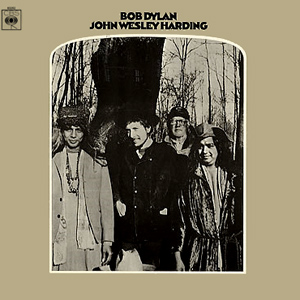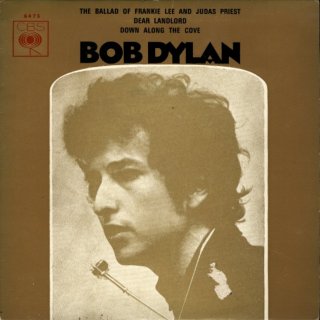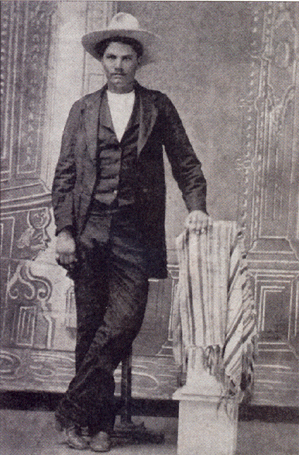See also
- John Wesley Hardin (1853–1895), American gun-fighter
John Wesley Harding is a 1967 Bob Dylan album.
John Wesley Harding may also refer to:
Wesley Stace is an English folk/pop singer-songwriter and author who has used the stage name John Wesley Harding. Under his legal name, he has written four novels. He is also an occasional university teacher and the curator of Wesley Stace's Cabinet of Wonders.
John Harding is the name of:

"All Along the Watchtower" is a song by American singer-songwriter Bob Dylan from his eighth studio album, John Wesley Harding (1967). The song was written by Dylan and produced by Bob Johnston. The song's lyrics, which in its original version contain twelve lines, feature a conversation between a joker and a thief. The song has been subject to various interpretations; some reviewers have noted that it echoes lines in the Book of Isaiah, Chapter 21, verses 5–9. Dylan has released several different live performances, and versions of the song are included on some of his subsequent greatest hits compilations.

Thea Eve Gilmore, also known as Afterlight, is an English singer-songwriter. She has released more than twenty albums since her 1998 debut, Burning Dorothy. She has had three top 40 entries on the UK Albums Chart and one on the UK Singles Chart. Her first album as Afterlight was released on 15 October 2021.

John Wesley Harding is the eighth studio album by the American singer-songwriter Bob Dylan, released on December 27, 1967, by Columbia Records. Produced by Bob Johnston, the album marked Dylan's return to semi-acoustic instrumentation and folk-influenced songwriting after three albums of lyrically abstract, blues-indebted rock music. John Wesley Harding was recorded around the same time as the home recording sessions with The Band known as The Basement Tapes.

Bob Dylan's Greatest Hits is a 1967 compilation album of songs by the American singer-songwriter Bob Dylan. Released on March 27, 1967, by Columbia Records, it was a stopgap between Dylan's studio albums Blonde on Blonde and John Wesley Harding, during which time he had retreated from the public eye to recover from a motorcycle accident.

"The Ballad of Frankie Lee and Judas Priest" is a song by American singer-songwriter Bob Dylan. It was released as the fifth track on his eighth studio album John Wesley Harding (1967). The track was written by Dylan and produced by Bob Johnston. It was recorded in one take on October 17, 1967, at Columbia Studio A in Nashville. The song's lyrics refer to two friends, Frankie Lee and Judas Priest. Lee asks Priest for a loan of money and Priest offers it freely. Lee spends it in a brothel over 16 days, then dies of thirst in Priest's arms. It has been suggested by commentators that the song refers to Dylan's relationship with his manager Albert Grossman or to his contractual negotiations with his record company. The song received a mixed critical reception. Dylan performed the song live in concert 20 times, from 1987 to 2000.

Johnny Cash Sings the Ballads of the True West is a concept double album and the 22nd overall album released by country singer Johnny Cash, released on Columbia Records in 1965. Covering twenty individual songs, the album, as its title suggests, contains various ballads and other songs on topics related to the history of the American Old West. This includes Carl Perkins' "The Ballad of Boot Hill", "Streets of Laredo", and the sole single from the album, "Mr. Garfield", describing the shock of the population after the assassination of President James Garfield. One of the songs, "25 Minutes to Go", would later be performed at Folsom Prison and appear on Cash's famous At Folsom Prison recording in 1968, while the melody of "Streets of Laredo" would be recycled for the song "The Walls of a Prison" featured on Cash's album From Sea to Shining Sea.

"Tonight I'll Be Staying Here with You" is a song written by Bob Dylan from his 1969 album Nashville Skyline. It was the closing song of the album. The song was the third single released from the album, after "I Threw It All Away" and "Lay Lady Lay", reaching #50 on the US Billboard Hot 100 chart, and reaching the top 20 in other countries. It was anthologized on the compilation albums Bob Dylan's Greatest Hits Vol. II and Playlist: The Very Best of Bob Dylan '60s.
"The Wicked Messenger" is a song written and originally performed by Bob Dylan for his album John Wesley Harding. The song was recorded at Columbia's Studio A, Nashville, on November 29, 1967.

The Name Above the Title is an album by the folk-rock singer John Wesley Harding, released in 1991. It was his third successive Frank Capra-inspired album title, coming from the director's autobiography.
"I Am a Lonesome Hobo" is a song written and recorded by Bob Dylan, released in 1967 on his eighth studio album, John Wesley Harding. The song was produced by Bob Johnston.
"I Dreamed I Saw St. Augustine" is a song by Bob Dylan that was originally released on his 1967 album John Wesley Harding. It was recorded at the first John Wesley Harding session on October 17, 1967. It has been covered by many artists, including Joan Baez on her all-Dylan album Any Day Now, as well as by Vic Chesnutt, Eric Clapton, John Doe, Thea Gilmore, Adam Selzer and Dirty Projectors. In addition, Jimi Hendrix at one point intended to cover this song, but felt it was too personal to Dylan and instead covered a different song from the album, "All Along the Watchtower".

"Drifter's Escape" is a song written by Bob Dylan that he recorded for his 1967 album John Wesley Harding. Columbia Records released it as a single in the US and the UK in 1969 as the B-side to "I Threw It All Away". The song was recorded in four takes on October 17, 1967. CBS Records International also issued the song paired with "John Wesley Harding" in some markets.

The Original Mono Recordings is a box set compilation album of recordings by Bob Dylan, released in October 2010 on Legacy Recordings, catalogue 88697761042. It consists of Dylan's first eight studio albums in mono on nine compact discs, the album Blonde on Blonde being issued on two discs in its original vinyl format. It does not include the singles collection Bob Dylan's Greatest Hits released during the same time span. The set includes a 56-page booklet with photographs, discographical information, and an essay by Greil Marcus. It peaked at No. 152 on the Billboard 200.
"John Wesley Harding" is a song by American singer-songwriter Bob Dylan that appears as the opening track on his 1967 album of the same name.

John Wesley Hardin's legacy as an outlaw has made him a colorful character and the subject of various media works from his own time up to the present day. Many people came to know of Hardin through the TV ad for Time-Life Books "Old West" series. During the description of one book in the series The Gunfighters, the well-known claim is made: "John Wesley Hardin, so mean, he once shot a man just for snoring too loud"

Trad Arr Jones is a tribute album to Nic Jones by British-American folk singer John Wesley Harding. The album consists of Harding's covers of Jones' arrangements of eleven traditional songs, hence the album's title, which is short for "Traditional, Arranged by Jones". It is very different from Harding's previous albums, partly because Harding used to dislike English folk music like Jones'.
"I Pity the Poor Immigrant" is a song by American singer-songwriter Bob Dylan. It was recorded on November 6, 1967, at Columbia Recording Studios in Nashville, Tennessee, produced by Bob Johnston. The song was released on Dylan's eighth studio album John Wesley Harding on December 27, 1967.
"Dear Landlord" is a song by American singer-songwriter Bob Dylan. It was recorded on November 29, 1967, at Columbia Recording Studios, Nashville, produced by Bob Johnston. The song was released on Dylan's album John Wesley Harding on December 27, 1967. It is a piano blues that has been interpreted as an address to his then-manager Albert Grossman.